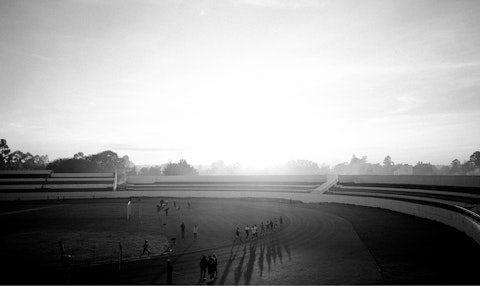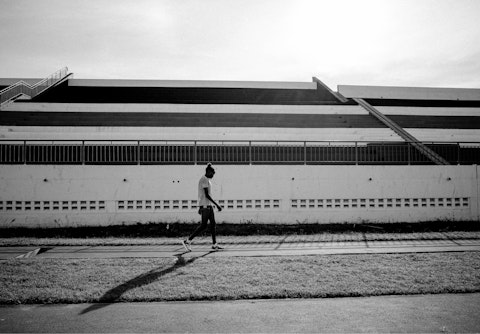
Agnes Jebet Ngetich — more than a story
"I started running in school. I went for school competitions and sometimes I was running barefoot, actually, and without food. Because even when you don't have any food in the house, you just go to the competition anyway." — Agnes Jebet Ngetich
A backstory — understanding the path to now — can say a lot about the tales yet to be told. Some stories are more — the inspirational stories.
This is the story of Agnes.

We are all a story — the sum of our experiences. Reading the stories of other people provides an opportunity to reflect on our own situation. A moment of external observation — acknowledging what someone else has been through — enabling us to place ourselves. To recognize value in what is easily taken for granted. All stories are remarkable in their own unique way. But some stories penetrate deeper because they reveal the uncomfortable truth that we are often more fortunate than we realise. These are the inspirational stories. This is the story of Agnes Ngetich.

23-year-old Kenyan, Agnes, recently set a new World Record, becoming the first woman to run under 29-minutes for 10km on the road.
Agnes is the second child in a family of seven sisters and a brother. Growing up in a home with a traditional division of roles meant that her father, a secondary school chemistry and mathematics teacher, provided the main income to pay for school fees and food. When Agnes was 10 years old, he died from cancer. The trauma was a catalyst for immediate change. The sudden loss hit her mother hard. Consumed by a loss of hope for a stable future, she turned to alcohol.
Agnes picked up the slack, transferring the weight of responsibility for supporting the family onto her own shoulders. To help put food on the table at home, she sacrificed her education, undertaking hard, physical work that not only reinforced the emotional responsibility she now carried, but also added a literal burden. She would work long hours digging on local farms or earn some money carrying bags of charcoal from the forests to the roadside.
"I tried to work hard — to go to work on someone's farm to be paid — as a kid. I would miss school to go to someone's farm to work. And when he or she paid me, I would go home to get some food." In the absence of running, had things not worked out differently, Agnes is quite matter-of-fact that this would have been her life.
Maintaining contact with school for just one day every week gave Agnes important exposure to competitive running. Even if it meant arriving at the start line without shoes, she still took part in races. "I started running in school. I went for school competitions and sometimes I was running barefoot, actually, and without food. Because even when you don't have any food in the house, you just go to the competition anyway."

Like most great stories, the crux hinges on a pivotal moment — a chance encounter or a moment of trust. Hardened by physical labor, Agnes had clearly accrued some strength, but the route from showing potential to realising potential often requires doors to open that the individual doesn't have the key for. To the cynical, these external forces might be described flippantly as luck or fate. But when you talk with Agnes and experience her drive, it's hard to imagine that she wouldn't have risen to the top by some other means anyway. While competing in school competitions she sometimes fainted and fell. But the potential didn’t go unnoticed. Ruth Bundotich — “Madame Ruth” — saw that Agnes had a spark. It’s an eye for performance that comes from years spent watching junior races — an ability to look deeper. Because a backstory can say a lot about the tales yet to be told.
At the age of 14 — enabled by Madame Ruth's tutelage — Agnes moved out of home and joined a junior athletics camp where she was able to train and gain an education. As more doors opened — the momentum of progress — so the trickle-down of support began to benefit the rest of the family, and the burden of being the surrogate head of the household lightened.
Podiums and victories at local races soon followed, but as school finished and Agnes moved her training at Iten, so the international exposure swelled. There was excitement at the 2023 Transylvania 10k when Agnes set a new World Record, only for the result to be nulled after World Athletics re-measured the course and found it to be 25 meters short. At Lille, a few months later — in atrocious weather — Agnes was just 8 seconds shy of the record. Eventually, at Valencia, it was written in history. She officially became the first woman to run under 29 minutes for 10,000 metres — ratified.
With life experience beyond her years, Agnes is unfazed by the hurdles that can derail running performance. There's a mature rationality with which she brushes aside moments of disappointment. "I fought for this record. When the course was short, maybe I was not ready for it. When the weather was bad, I understand. I had to make my mind strong and not let it discourage me."

This is when you get a sense of how the cumulative life experiences add up to make the whole person. How Agnes is able to draw upon the moments in her life that were tough in order to positively influence her running mindset. Asked why she was the one capable of breaking the world record, Agnes succinctly answers, "Patience and discipline... you train hard and then you go and win easy. Let it be painful today and then the fruits come next week." In sport, words like grit and graft, and phrases like 'HTFU' or 'go hard or go home', are overused to the point of being hollow — tossed around like empty gel wrappers. But how do you arrive at conviction without having lived some level of hardship first? Does a dogged resolve to distance yourself from a period of adversity grow inside someone, or is determination innate? You've either got it, or you haven't. It’s more than tenacity.
The tone and softness with which Agnes talks belies a hardened ethos — a steadfastness. She is devoted to the long-term process of becoming a better runner, but you get a sense that this robustness is something that she has been able to transfer into the sport. The times of hardship have primed her with an attitude and work ethic that are well suited to the demands of running. "Running means a lot to me. It has challenged me on how life was and how life is." When her family had nobody, Agnes stepped up.
What type of runner are you, we asked. The answer, immediate and bold, goes beyond sport. It’s not Agnes ‘the runner’, it’s Agnes ‘the human’ — “I can say, I’m a fighter.” We watched her training at the track — a gut-boiling 25 x 400 meter session. It was Agnes versus the men. “It’s hard to find strong women who can go with me, so I train with the guys. I like to try and go with their speed.” And as the session deepened it was the men struggling, unable to match Agnes. “You saw them,” she laughs, “behind me, asking to reduce the pace.” This is an athlete loving her sport. Having fun. “Running is like food for me — you don’t miss food, I don’t miss running.”

Discipline is woven into every layer, instilled by her female coaches. A core pillar of understanding that, as an athlete, there are moments when you need to be straightened out — brought back into line. Because there’s a goal at the end, and if the path to that goal meanders too much then the journey adds too much distance and loses focus.
The knock-on benefit extends to the rest of the family. Agnes can impart her experience and learnings to help her younger siblings foster a mindset of discipline and method — the paternal influence that Agnes missed. “I can say I am a father to them. They have full respect for me.” While she runs a tight ship in the home, the purpose is founded on protecting her family from the hardship that she endured. “I don’t want to see them struggle or miss school like I did in my past. I don’t want to see them doing the work for other people to get food.”

Words by Ross Lovell, Photos by Herman Reuterswärd